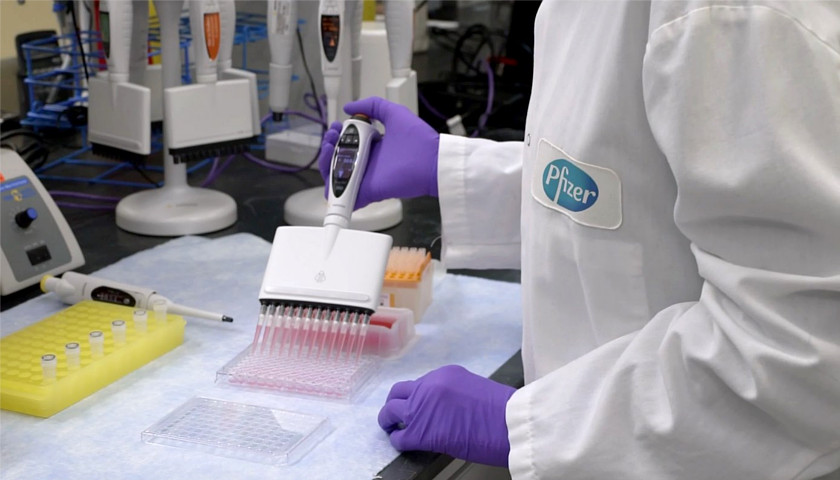One of Ohio’s largest hospital systems is not distributing the Food and Drug Administration’s (FDA) fully approved COVID-19 vaccine, it confirmed to The Ohio Star Wednesday.
“As of today’s stock, we are currently distributing the Pfizer vaccine that does not have the Comirnaty branding label,” Katie Logan, a spokeswoman for OhioHealth said by email.
In August, the FDA approved Pfizer’s COVID-19 vaccine called Comirnaty (pronounced kuh-MUR-nit-ee). OhioHealth is still giving out the non-FDA approved version of the Pfizer vaccine, which was authorized under an Emergency Use Authorization (EUA) earlier this year.
OhioHealth runs 12 hospitals statewide, and describes itself as “a family of 35,000 associates, physicians and volunteers.” It has “ambulatory sites, hospice, home health, medical equipment and other health services spanning 47 Ohio counties.”
Whether Pfizer is distributing Comirnaty is unknown, but the company told The Star Monday that it is still shipping the EUA version of the vaccine.
“The Pfizer-BioNTech COVID-19 Vaccine (EUA labeled product) is currently being shipped; however, please be advised that the COMIRNATY and the Pfizer-BioNTech COVID-19 Vaccine have the same formulation and can be used interchangeably. They are made using the same processes, and there are no differences between them in safety or effectiveness,” the company said by email.
The Ohio Department of Health (ODOH), in charge of distribution of the vaccines, could not be reached for comment.
Asked multiple times if Comirnaty is in use anywhere, Pfizer did not respond.
Though Pfizer says the vaccines are interchangeable, the FDA concedes that the products are “legally distinct.”
The Star asked the FDA to explain what specific differences there are between Comirnaty and the Pfizer’s EUA vaccine. After a series inquiries, the FDA explained that the Biologics License Applications (BLAs) – the labeling of Comirnaty and the EUA version of the vaccine – are different. It did not directly address The Star’s inquiry about the specific differences between Comirnaty and the EUA vaccine, or why Pfizer is not shipping Comirnaty if the formulas are “interchangeable.”
The FDA told The Star:
The statutory authorities governing BLAs and EUAs are distinct and provide different legal requirements. The vaccine distributed pursuant to the BLA approval is subject to the requirements of the BLA under section 351 of the Public Health Service Act, while the EUA vaccine is subject to the requirements of the EUA issued pursuant to section 564 of the FD&C Act. For example, EUA Fact Sheets must be provided for the EUA product but not for the approved BLA product.
The FDA-approved Comirnaty (COVID-19 Vaccine, mRNA) and the two EUA authorized formulations of Pfizer-BioNTech COVID-19 Vaccine for ages 12 years and older, when prepared according to their respective instructions for use, can be used interchangeably without presenting any safety or effectiveness concerns. For purposes of administration, doses distributed under the EUA are interchangeable with the licensed doses. The Vaccine Information Fact Sheet for Recipients and Caregivers provides additional information about both the approved and authorized vaccines.
Information regarding manufacturing locations and materials is generally considered non-public information under disclosure statutes and FDA regulations, unless previously disclosed by the manufacturer. Certain facilities involved in the manufacture of Comirnaty have been made public in the Summary Basis for Regulatory Action posted on FDA’s website. Please contact Pfizer directly to inquire about the manufacture of Comirnaty and Pfizer-BioNTech COVID-19 Vaccine.
FDA does not oversee the distribution of COVID-19 vaccines. Please contact Pfizer and/or HHS’s Countermeasures Acceleration Group.
HB 244, recently passed by the Ohio State Legislature and signed into law by Gov. Mike DeWine (R) says, “a public school or state institution of higher education shall not . . . Require an individual to receive a vaccine for which the United States food and drug administration has not granted full approval.”
Currently, Ohio’s public universities including Ohio State University, Ohio University, and Wright State University all require students to be vaccinated against COVID-19.
The Star asked those universities whether they were distributing Comirnaty or Pfizer’s EUA vaccine. Ohio University told The Star that OhioHealth distributes their vaccines.
“They are being distributed in this area by the Athens City-County Health Department and OhioHealth,” Jim Sabin, a school spokesman said.
The Star also reached out to Attorney General Dave Yost’s office Monday to see if it knew whether the schools were following the law and distributing Comirnaty, instead of the EUA vaccine.
“I believe HB244 only applied to EUA and the EUA has expired sine [sic] the FDA fully approved the vaccines,” Bethany McCorkle, Communications Director for Yost, told The Star. “So I’m not sure that applies.”
“We have not heard of any issues with Ohio universities mandating EUA vaccines,” she said.
Yost’s office did not return a follow up request Wednesday.
Military members were also required to take the COVID-19 vaccine based on the premise that it had been fully approved by the FDA.
Recently, a lawsuit was brought by several military members against the Department of Defense (DOD) in opposition to the mandate requiring military members to take the COVID-19 vaccine, as long as the vaccine was fully approved by the FDA. The plaintiffs filed the lawsuit anonymously for fear of reprisal, and for that reason, it was eventually thrown out.
In a 32-page ruling handed down on Nov. 12, Federal Judge Allen Winsor of the United States District Court for the District of Northern Florida noted that “Pfizer continues to produce vials of vaccine that are labeled as an EUA drug with packaging material saying, ‘This product has not been approved or licensed by the FDA…'”
“In short, what people think of as the Pfizer vaccine has two distinct FDA approval statuses,” Winsor wrote. “It is licensed—that is, fully approved—for the two-dose application in those 16 and older. But it is unlicensed and operating under an EUA— that is, an emergency use authorization—for other applications, like for children under 16 and for certain third shots. Nonetheless, the FDA describes the two as the ‘same formulation’ and ‘interchangeabl[e]’ for medical purposes.”
Later in the ruling, Winsor wrote that the DOD provided no evidence that Pfizer was actually distributing Comirnaty instead of the original EUA vaccine.
“Notably, though, the plaintiffs have shown that the DOD is requiring injections from vials not labeled ‘Comirnaty,’ the ruling said. “Indeed, defense counsel could not even say whether vaccines labeled ‘Comirnaty’ exist at all. (Although the DOD’s response said it had an adequate Comirnaty supply, it later clarified that it was mandating vaccines from EUA-labeled vials…).”
The DOD contended that for practical purposes, Pfizer’s EUA vaccine and Comirnaty are the same.
“Rather, the DOD argues that once the FDA licensed Comirnaty, all EUA-labeled vials essentially became Comirnaty, even if not so labeled,” the ruling said.
Winsor called that argument “unconvincing.”
Monday, the Air Force discharged 27 personnel for refusal to take the COVID-19 vaccine.
Robert Barnes is a high-profile attorney in California. He is also a political commentator. Wednesday, he spoke by email to The Star.
“It is an illicit bait and switch. There is no FDA approved Covid19 vaccine available in the US,” he said. “The unavailable FDA biologic license approved drug is not medically identical & has to abide different manufacturing standards. As important, you have less legal rights and fewer legal remedies when you take an EUA drug than a biologic licensed drug. This directly impacts the legal rights of all Americans.”
In a Dec. 9 notice of reissuance of the EUA for the original Pfizer vaccine to give booster shots to 16 and 17-year-olds, the FDA said, “[a]lthough COMIRNATY (COVID-19 Vaccine, mRNA) is approved to prevent COVID-19 in individuals 16 years of age and older, there is not sufficient approved vaccine available for distribution to this population in its entirety at the time of reissuance of this EUA.”
– – –
Pete D’Abrosca is a reporter at The Star News Network. Follow Pete on Twitter. Email tips to [email protected].
Photo “Pfizer Vaccine” by U.S. Secretary of Defense. CC BY 2.0.





